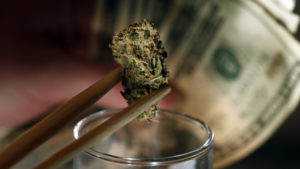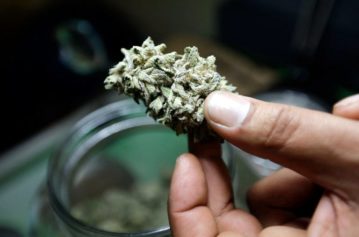
While the process has been relatively slow, the push to legalize marijuana has been growing all across the nation. In addition to providing the U.S. with another profitable industry, pot-legalization also sparked hopes that the Black community could be one the main ones to garner more economic security from the change.
But it’s a drastically different perception of the industry for a community that has long been plagued by its existence.
According to an ACLU report from 2013, a Black person is nearly four times more likely to be arrested for marijuana possession than their white counterparts, despite the fact that “blacks and whites use marijuana at similar rates.”
It’s a part of the treacherous impact that the country’s “war on drugs” has had on the Black community. After spending so much time suffering as a victim of mass incarceration that was fueled by the war on drugs, a stigma has been created around the marijuana industry and the entire culture surrounding it.
“There’s more of a negative stigma surrounding this industry—the [cannabis] culture and religion [in the Black community] plays a heavy factor,” Lakisha Jenkins, president of the California Cannabis Industry Association, told NBC News. “Since we’re the ones who’ve been incarcerated [the most for marijuana possession and use] it makes it rather difficult [for some people of color] to see it as a positive and viable industry.”
That’s why Rev. Del T. Phillips, the president of the Greater Metro Denver Ministerial Alliance, which represents roughly 50 Black churches, calls the push to get the Black community to rally behind the legalization of marijuana a “mixed message.”
“It’s kind of a mixed message,” he told NBC News. “One minute you’re being arrested [for selling marijuana] and the next minute someone’s throwing up a building and selling the very same substance legally. We feel like it’s sort of a double indemnity against our community because before it was legal, there were more African-Americans being charged and put into the prison system for the very same thing.”
It’s a trend that has failed to change even with the legalization of marijuana in some states. Black citizens in Colorado still account for a disproportionately greater amount of arrests related to marijuana in the state.
Despite a significant drop in charges for pot possession, distribution and cultivation—which collectively fell about 95 percent since 2010—Black citizens were still accounting for a staggering amount of public use and cultivation charges.
So even as marijuana became legal in the state, Black people were still far more likely than their white counterparts to end up behind bars over charges related to the drug.
“Nationwide there are millions of dollars being put into policing mostly otherwise law-abiding citizens for one of the least addictive substances,” Art Way, the Drug Policy Alliance’s Colorado director who works closely with industry advocates on decriminalization and legalization efforts, told NBC News. “We feel that money could be better used for prevention and education initiatives.”
It all creates a troubling image of the industry that is now being touted as a “proverbial pot of gold” to the Black community.
But could the stigmas and fear of the industry be keeping the Black community barred from taking advantage of what could be a major economic shift? Many advocates of marijuana legalization think so.
In addition to helping communities save on the costs they would have acquired from the continuation of countless marijuana-related arrests, it could be a great way for Black entrepreneurs to garner control of a new industry that is sure to sweep the nation in a matter of years.
“Updated data from the pro-legalization Drug Policy Alliance (DPA) organization reveals that the first year of legal retail marijuana sales resulted in $52.5 million in tax revenue, not including revenue from licenses, fees and medical marijuana,” NBC News reported.
The potential for profit here, considering the Black community’s combined spending power of over $1 trillion, is substantial and is causing legalization activist Charlo Greene to urge more Black people to back the cause despite their troubling history with marijuana and mass incarceration.
“Whenever I go to a cannabis community gathering, I’m usually the one of maybe two or three African-Americans that are present,” said Greene, a former TV host who became a viral sensation after she quit her job on live television to dedicate her time to advocating for the legalization of marijuana, to the Huffington Post. “I don’t know if us as a people are more apprehensive about getting into this knowing we would probably draw greater scrutiny than any other group just because of the history we have with this plant. I really don’t know what it is. But I hope to see more people coming out and taking a stand and using something that has been used to hold us back and down for so long [and instead use it] to advance our communities.”
Of course, the erection of any new profitable industry comes with challenges and downfalls.
According to a series published in The Colorado Springs Gazette, the number of children being hospitalized for ingesting marijuana edibles has increased in Colorado and there are concerns about marijuana growhouses and other infrastructure being concentrated solely on Black communities.
There are concerns that it could bring even more crime into impoverished neighborhoods while profits from the industry fail to go towards growing and improving the communities.
As with any new industry, it presents a plethora of promise and a minefield of missteps that could rid it of any beneficial impact on the Black community.
What will matter now are the ethics and standards that will need to grow along with the popularity and legalization of the marijuana industry.



